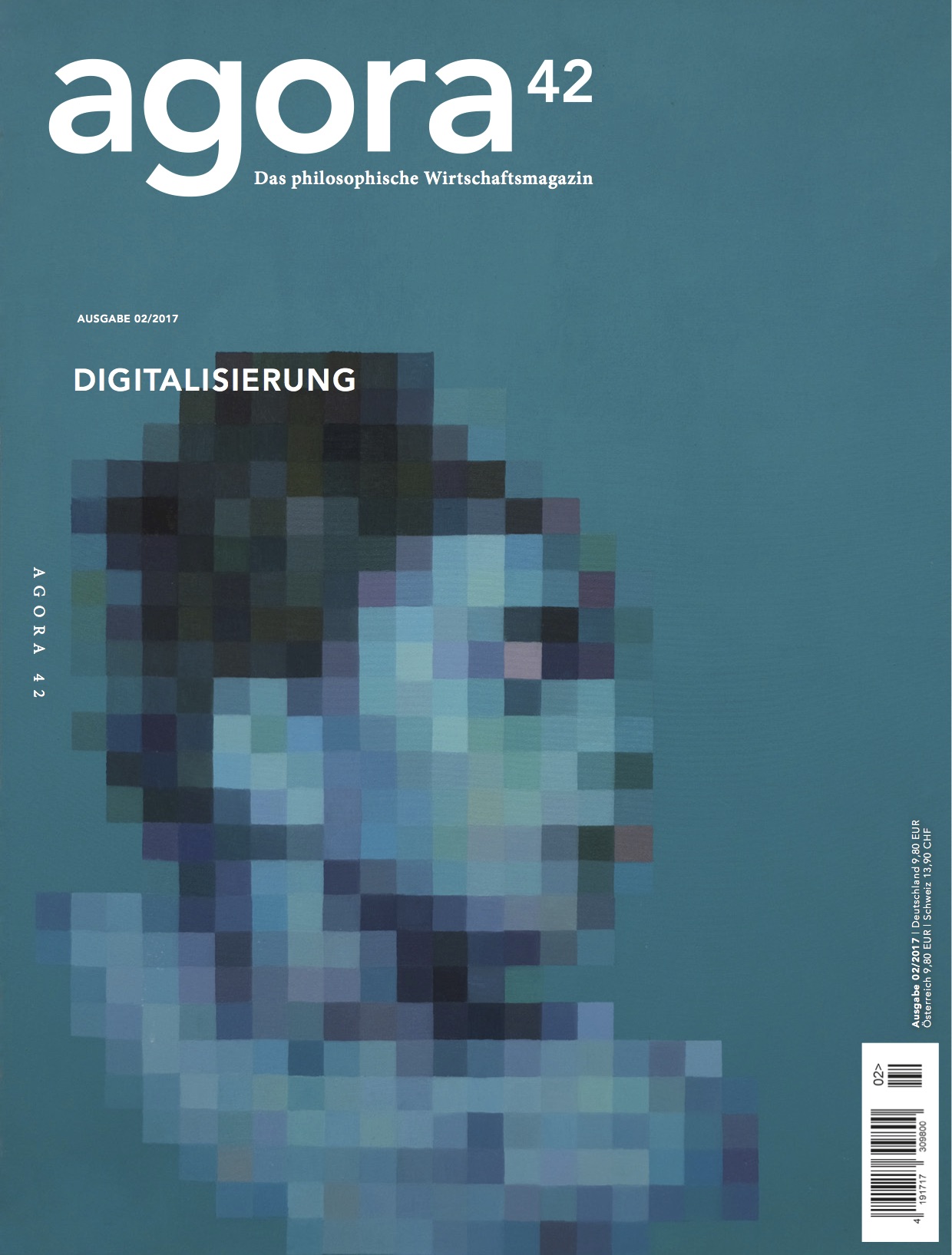Digital Reset. Redirecting Technologies for the Deep Sustainability Transformation.
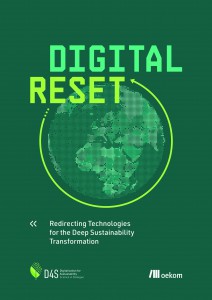 Governments around the world see digitalization as a solution to the pressing social and ecological crises of our time. At the same time, scientific evidence shows that digitalization tends to exacerbate many existing problems. In the report “Digital Reset. “Redirecting Technologies for the Deep Sustainability Transformation”, Tilman Santarius and a team of 15 renowned European experts present how a fundamental realignment of digitalization can be achieved at the European and national level so that it becomes compatible with a climate-neutral and future-fit social transformation path. Read more here…
Governments around the world see digitalization as a solution to the pressing social and ecological crises of our time. At the same time, scientific evidence shows that digitalization tends to exacerbate many existing problems. In the report “Digital Reset. “Redirecting Technologies for the Deep Sustainability Transformation”, Tilman Santarius and a team of 15 renowned European experts present how a fundamental realignment of digitalization can be achieved at the European and national level so that it becomes compatible with a climate-neutral and future-fit social transformation path. Read more here…
A Call for a Digital Green Deal
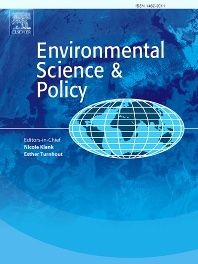 This article, written by Tilman Santarius and a team of interdisciplinary experts from various European Universities, calls for a Digital Green Deal that includes strong, cross-sectoral green digitalization policies on all levels of governance. We argue that such current digital policy initiatives, e.g. at EU level, should include measures that service environmental goals, and environmental policy initiatives must address risks and advance opportunities of digital technologies. The call for a Digital Green Deal is based on a broad and up-to-date review of the vast interdisciplinary literature on the relation between digitalization and environmental sustainability.
This article, written by Tilman Santarius and a team of interdisciplinary experts from various European Universities, calls for a Digital Green Deal that includes strong, cross-sectoral green digitalization policies on all levels of governance. We argue that such current digital policy initiatives, e.g. at EU level, should include measures that service environmental goals, and environmental policy initiatives must address risks and advance opportunities of digital technologies. The call for a Digital Green Deal is based on a broad and up-to-date review of the vast interdisciplinary literature on the relation between digitalization and environmental sustainability.
Climate justice and digitalization. A plea to consider broader socio-economic implications of digitalization and climate change
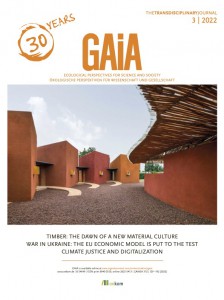 This article by Tilman Santarius in the Journal GAIA Justice and Digitalization – GAIA 2022 considers the broader socio-economic implications of digitalization on various dimensions of climate justice. Indeed, digitalization will affect the way the impacts of global warming and the co-benefits of climate protection are distributed. To advance fair benefit sharing of digital climate technologies, the decentralization of technological development must be initiated, and rules for fair competition must be established.
This article by Tilman Santarius in the Journal GAIA Justice and Digitalization – GAIA 2022 considers the broader socio-economic implications of digitalization on various dimensions of climate justice. Indeed, digitalization will affect the way the impacts of global warming and the co-benefits of climate protection are distributed. To advance fair benefit sharing of digital climate technologies, the decentralization of technological development must be initiated, and rules for fair competition must be established.
Nudging Sustainable Consumption: A Large-Scale Data Analysis of Sustainability Labels for Fashion in German Online Retail.
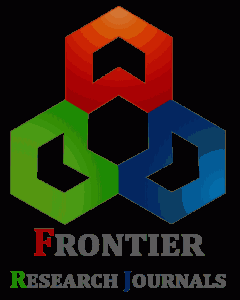 A transition toward a sustainable way of living is more pressing than ever. How do online retailers provide information on the sustainability of products to consumers? This article by Maike Gossen, Tilman Santarius and further team members in the journal Frontiers in Sustainability is based on a large-scale dataset we built by using AI methods, and which contains sustainability information of nearly 17,000 fashion products of leading online retailers in Germany. We find that only 14% of the tagged products present credible third-party verified sustainability labels. Hence, we strongly recommend political initiatives that tackle the risk of greenwashing resulting from uncertified and weak sustainability information in e-commerce.
A transition toward a sustainable way of living is more pressing than ever. How do online retailers provide information on the sustainability of products to consumers? This article by Maike Gossen, Tilman Santarius and further team members in the journal Frontiers in Sustainability is based on a large-scale dataset we built by using AI methods, and which contains sustainability information of nearly 17,000 fashion products of leading online retailers in Germany. We find that only 14% of the tagged products present credible third-party verified sustainability labels. Hence, we strongly recommend political initiatives that tackle the risk of greenwashing resulting from uncertified and weak sustainability information in e-commerce.
Digitalization and sustainability: A systematic literature analysis of ICT for Sustainability research
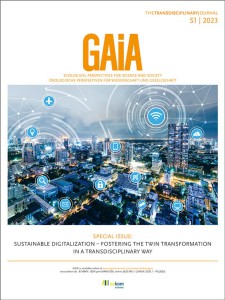 It is important to understand the opportunities and risks of digital technologies (ICT) for a sustainable transformation of society. In Digitalization and sustainability- A systematic literature analysis of ICT for Sustainability research – Santarius+Wagner 2023 in order to investigate the state of debate. We cluster them according to different levels of action (micro, meso, macro) as well as regarding different sustainability strategies (efficiency, consistency, sufficiency). We find that ICT4S research has a one-sided focus on digital efficiency improvements and on life-cycle impacts of ICT devices and applications. Much more research is needed regardingt digitalization’s potential to advance sufficiency-oriented practices, and transformations at macro-level.
It is important to understand the opportunities and risks of digital technologies (ICT) for a sustainable transformation of society. In Digitalization and sustainability- A systematic literature analysis of ICT for Sustainability research – Santarius+Wagner 2023 in order to investigate the state of debate. We cluster them according to different levels of action (micro, meso, macro) as well as regarding different sustainability strategies (efficiency, consistency, sufficiency). We find that ICT4S research has a one-sided focus on digital efficiency improvements and on life-cycle impacts of ICT devices and applications. Much more research is needed regardingt digitalization’s potential to advance sufficiency-oriented practices, and transformations at macro-level.
Smart Green World? Making Digitalization Work for Sustainability
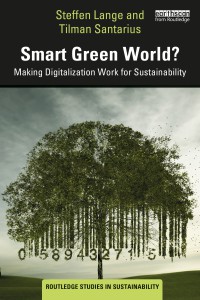 The digital revolution is currently changing the daily lives of billions of people worldwide. It is also disrupting the economy, generating new opportunities and creating new challenges. Yet can the much-discussed disruption potential of digitalization be harnessed for the purpose of sustainability? Can digitization help achieving a social and environmental transformation of society? The book “Smart Green World” provides guiding principles for a sustainable digitalization and develops hands-on policies and proposals how to achieve those.
The digital revolution is currently changing the daily lives of billions of people worldwide. It is also disrupting the economy, generating new opportunities and creating new challenges. Yet can the much-discussed disruption potential of digitalization be harnessed for the purpose of sustainability? Can digitization help achieving a social and environmental transformation of society? The book “Smart Green World” provides guiding principles for a sustainable digitalization and develops hands-on policies and proposals how to achieve those.
A former version of the book has been published in German, see here.
Video on the results of the book
Tilman Santarius and Steffen Lange presenting key findings from their book “Smart Green World?”
Assessing the environmental performance of ICT-based services: Does user behaviour make all the difference?
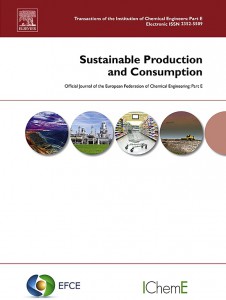 Reducing household energy consumption through ICT can play an important role in the transformation towards sustainable consumption patterns. Yet, the challenge in the environmental assessment of ICT applications is to also consider their use-specific environmental effects, as these can be decisive for overall results. In this article in the Journal of Sustainable Production and Consumption by Johanna Pohl, Tilman Santarius and further co-authors, we analyse the environmental performance of 375 smart home systems in Germany. Regarding the Global Warming Potential, we find that heating can have significant benefits in special cases, but does not lead to significant benefits on average. Regarding Metal Depletion Potential, we find that smart heating is always an additional burden.
Reducing household energy consumption through ICT can play an important role in the transformation towards sustainable consumption patterns. Yet, the challenge in the environmental assessment of ICT applications is to also consider their use-specific environmental effects, as these can be decisive for overall results. In this article in the Journal of Sustainable Production and Consumption by Johanna Pohl, Tilman Santarius and further co-authors, we analyse the environmental performance of 375 smart home systems in Germany. Regarding the Global Warming Potential, we find that heating can have significant benefits in special cases, but does not lead to significant benefits on average. Regarding Metal Depletion Potential, we find that smart heating is always an additional burden.
Digital Sufficiency: Conceptual Considerations for ICTs on a Finite Planet.
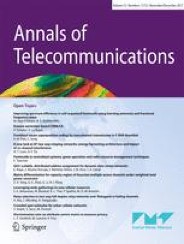 Information and Communication Technologies hold significant potential to increase resource and energy efficiencies and contribute to a circular economy. This article by Tilman Santarius and 9 others international authors in the Annals of Telecommunications for the first time develops the concept of Digital Sufficiency, which constitutes a basis to understand how ICT can become part of a deep sustainability transformation. The conceptual work builds on five years of multidisciplinary empirical and theoretical work on digitalization and sustainability. The article manifests four dimensions of Digital sufficiency – hardware sufficiency, software sufficiency, user sufficiency, and economic sufficiency – and presents a set of strategies and policy proposals for each.
Information and Communication Technologies hold significant potential to increase resource and energy efficiencies and contribute to a circular economy. This article by Tilman Santarius and 9 others international authors in the Annals of Telecommunications for the first time develops the concept of Digital Sufficiency, which constitutes a basis to understand how ICT can become part of a deep sustainability transformation. The conceptual work builds on five years of multidisciplinary empirical and theoretical work on digitalization and sustainability. The article manifests four dimensions of Digital sufficiency – hardware sufficiency, software sufficiency, user sufficiency, and economic sufficiency – and presents a set of strategies and policy proposals for each.
When your shop says #lessismore. A field and laboratory intervention on online communication for clothing sufficiency.
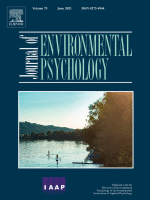 This article by Vivian Frick, Maike Gossen, Tilman Santarius and Sonja Geiger in the Journal of Environmental Psychology empirically investigates whether online marketing interventions, especially on social media, can foster less consumption. In two experiments, consumption reduction and prolonging the lifetime of clothes were promoted. We find that sufficiency-promoting marketing leads to less shopping compared to consumption-promoting marketing. However, endorsement of the marketing communications by other social media users did not have any effect.
This article by Vivian Frick, Maike Gossen, Tilman Santarius and Sonja Geiger in the Journal of Environmental Psychology empirically investigates whether online marketing interventions, especially on social media, can foster less consumption. In two experiments, consumption reduction and prolonging the lifetime of clothes were promoted. We find that sufficiency-promoting marketing leads to less shopping compared to consumption-promoting marketing. However, endorsement of the marketing communications by other social media users did not have any effect.
Environmental saving potentials of a smart home system from a life cycle perspective: How green is the smart home?
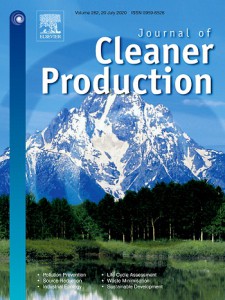 Smart home applications have the potential to reduce household energy consumption. With an empirical study, we examine environmental saving potentials of smart home systems with automated heating functions. We conduct a life cycle assessment of an average smart home system in Germany. In this article by Johanna Pohl, Tilman Santarius and other coauthors in the Journal of Cleaner Production, we show that savings are indeed possible, but are conditional to user behavior and the number of other smart home system components. Including both the life cycle perspective and user-driven parameters is crucial when determining the total environmental effects of smart homes.
Smart home applications have the potential to reduce household energy consumption. With an empirical study, we examine environmental saving potentials of smart home systems with automated heating functions. We conduct a life cycle assessment of an average smart home system in Germany. In this article by Johanna Pohl, Tilman Santarius and other coauthors in the Journal of Cleaner Production, we show that savings are indeed possible, but are conditional to user behavior and the number of other smart home system components. Including both the life cycle perspective and user-driven parameters is crucial when determining the total environmental effects of smart homes.
Digitalization and the Decoupling Debate. Can ICT help to reduce environmental impacts while the economy keeps growing?
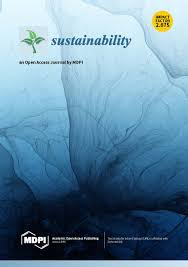 Digitalization can increase resource and energy productivities. However, the production and usage of ICT require materials and energy, and the application of ICT fosters economic growth. This article by Tilman Santarius, Johanna Pohl and Steffen Lange in the Journal Sustainability examines whether digitalization helps or hinders an absolute decoupling of environmental throughput from economic growth. The paper combines the literature on “green IT” and “ICT for green” with studies on the relationship between economic growth, technological change, and environmental throughput. Comparing the mitigating and the aggravating impacts of digitalization, we conclude that a more active political and societal shaping of the process of digitalization is needed to make ICT work for a sufficient absolute decoupling.
Digitalization can increase resource and energy productivities. However, the production and usage of ICT require materials and energy, and the application of ICT fosters economic growth. This article by Tilman Santarius, Johanna Pohl and Steffen Lange in the Journal Sustainability examines whether digitalization helps or hinders an absolute decoupling of environmental throughput from economic growth. The paper combines the literature on “green IT” and “ICT for green” with studies on the relationship between economic growth, technological change, and environmental throughput. Comparing the mitigating and the aggravating impacts of digitalization, we conclude that a more active political and societal shaping of the process of digitalization is needed to make ICT work for a sufficient absolute decoupling.
Do online environments promote sufficiency or overconsumption?
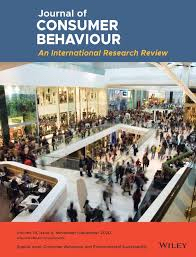 Sustainable consumption is increasingly shaped by online environments. Everyday exposure to online advertisement and social media content by peers may influence individual consumption decisions. By representative online surveys in the German population, this article by Vivian Frick, Ellen Matthies, John Thøgersen and Tilman Santarius in the Journal of Consumer Behavior examines how perception of online environments influences individual consumption levels of clothing, digital devices and leisure air travel. Our findings confirm a relationship between perceived consumption‐promoting online content and consumption levels. At the same time, sufficiency‐promoting online content is not linked to aspiration or consumption levels.
Sustainable consumption is increasingly shaped by online environments. Everyday exposure to online advertisement and social media content by peers may influence individual consumption decisions. By representative online surveys in the German population, this article by Vivian Frick, Ellen Matthies, John Thøgersen and Tilman Santarius in the Journal of Consumer Behavior examines how perception of online environments influences individual consumption levels of clothing, digital devices and leisure air travel. Our findings confirm a relationship between perceived consumption‐promoting online content and consumption levels. At the same time, sufficiency‐promoting online content is not linked to aspiration or consumption levels.
Digitalization and Energy Consumption. Does ICT Reduce Energy Demand?
 Digitalization is said to bear large potentials to reduce energy demand and greenhouse gas emissions. At the same time, criticism has been raised that digitalization may increase energy demand. Which effect will overall digitalization of the economy and society bring about? This article by Steffen Lange, Johanna Pohl and Tilman Santarius in the journal Ecological Economics combines empirical and theoretical findings from debates on decoupling energy consumption from economic growth and from debates on green IT and ICT for sustainability and finds four distinctive effects. The overall conclusion is: Digitalization will not automatically bring about reductions in energy demand and greenhouse gas emissions, but needs to be actively shaped by policies and measures in order to deliver those.
Digitalization is said to bear large potentials to reduce energy demand and greenhouse gas emissions. At the same time, criticism has been raised that digitalization may increase energy demand. Which effect will overall digitalization of the economy and society bring about? This article by Steffen Lange, Johanna Pohl and Tilman Santarius in the journal Ecological Economics combines empirical and theoretical findings from debates on decoupling energy consumption from economic growth and from debates on green IT and ICT for sustainability and finds four distinctive effects. The overall conclusion is: Digitalization will not automatically bring about reductions in energy demand and greenhouse gas emissions, but needs to be actively shaped by policies and measures in order to deliver those.
Does the Use of ICT speed up the Pace of Life?
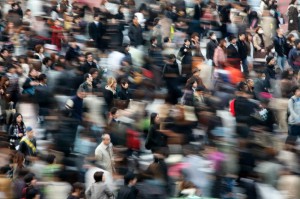 Information and Communication Technologies (ICT) greatly facilitate the way we communicate, do shopping, organize our schedules, research information and so on. Hence, ICT help us ‘save time’, or more specifically, increase the time efficiency of doing things, including consumption.This article reviews existing literature and presents genuine own results from a representative consumer survey in the German population in order to address the following key questions: Does the use of ICT correlate with an increase of the pace of life? Access Article here >>>
Information and Communication Technologies (ICT) greatly facilitate the way we communicate, do shopping, organize our schedules, research information and so on. Hence, ICT help us ‘save time’, or more specifically, increase the time efficiency of doing things, including consumption.This article reviews existing literature and presents genuine own results from a representative consumer survey in the German population in order to address the following key questions: Does the use of ICT correlate with an increase of the pace of life? Access Article here >>>
Sustainable digital mobility: Why Uber hurts public transport – Interview
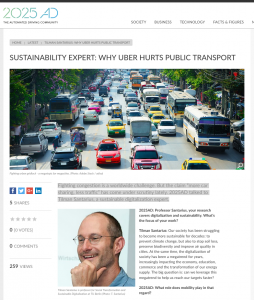 Fighting congestion is a worldwide challenge. But the claim “more car sharing, less traffic” has come under scrutiny lately. In the interview with 2025AD, Tilman Santarius explains why self-driving vehicles are dangerously data intensive, and what other digital soluations provide better opportunities for an sustainable mobility revolution.
Fighting congestion is a worldwide challenge. But the claim “more car sharing, less traffic” has come under scrutiny lately. In the interview with 2025AD, Tilman Santarius explains why self-driving vehicles are dangerously data intensive, and what other digital soluations provide better opportunities for an sustainable mobility revolution.
The Dark Side of Digitalisation – Interview
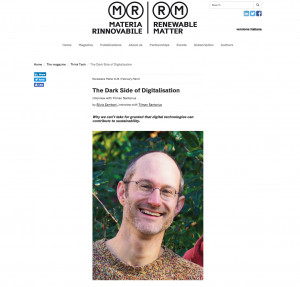 According to a report by the Global e-Sustainability Initiative, digital technologies can reduce greenhouse gases by 16% globally until 2030. But is glittering digitalisation really all gold? To what extent can it really contribute to a society that is environmentally and socially more sustainable? In this interview in RenewablesMatter, Tilman Santarius shows the potential for efficiency improvements and environmental opportunitites of digital technologies. But he also detects some pitfalls and risks, including rebound effects and other impacts that make certain digital technologies work against sustainability goals.
According to a report by the Global e-Sustainability Initiative, digital technologies can reduce greenhouse gases by 16% globally until 2030. But is glittering digitalisation really all gold? To what extent can it really contribute to a society that is environmentally and socially more sustainable? In this interview in RenewablesMatter, Tilman Santarius shows the potential for efficiency improvements and environmental opportunitites of digital technologies. But he also detects some pitfalls and risks, including rebound effects and other impacts that make certain digital technologies work against sustainability goals.
Digitalization, Efficiency and the Rebound Effect
Since the very beginning of modern growth-critique, the mainstream response to this critique has always been: “Well, we can grow the limits by making things ever more efficient”. Now, with the shiny user interface of the ongoing digital revolution, the holy grail of the efficiency revolution gets yet another new finish: By digitalizing almost every aspect of production and consumption we can increase our efficiency even more. However, in reality digitalization generates highly ambivalent effects on energy and resource consumption. Therefore, it needs a to be clearly embedded into social and environmental goals. See here the blog post by Tilman Santarius on degrwoth.de.
